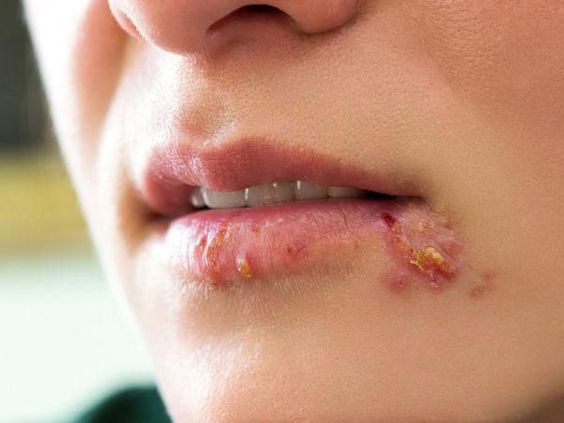The Epstein-Barr virus (EBV) is a herpes virus that is found worldwide and is a common cause of viral pharyngitis (infectious mononucleosis).
Thank you for reading this post, don't forget to subscribe!The cause of an Epstein-Barr infection (mononucleosis) is EBV; risk factors include intimate contact with body secretions (especially saliva) and objects that may be exposed to the body secretions of infected people.
EBV is contagious during the incubation period and while symptoms are present; some individuals may be contagious for as long as 18 months.
EBV is transmitted from person to person mainly by saliva; however, other body fluids may transmit the disease. Items contaminated with bodily fluids like saliva (toys, utensils, cups, for example) may also transmit the disease.
The incubation period for Epstein-Barr virus infection is about four to seven weeks.
The symptoms and signs of an Epstein-Barr Virus infection may include malaise, fever, muscle aches, headaches, sore throat, lymph node swelling, liver swelling, rash, and spleen swelling.
Preliminary diagnosis of Epstein-Barr Virus infection is based on the patient’s history and physical exam; physicians may also use immunological tests that vary in specificity.
Treatment of EBV infection is mainly supportive (see home remedies section); some health care providers use cortisone treatment.
Home remedies that may help reduce symptoms are rest, fluids, over-the-counter (OTC) pain medications, and avoiding trauma that can further injure organs like a swollen spleen.
The possible complications of Epstein-Barr Virus infection may include an enlarged spleen, jaundice, liver inflammation, anemia, splenic rupture, swollen tonsils, breathing difficulties, rash, irregular heartbeats, and a possible increased risk for cancer.
The majority of people with Epstein-Barr Virus have a good prognosis; a few have a more guarded prognosis.
There is no vaccine for Epstein-Barr Virus, and prevention is difficult. Risk can be reduced by not contacting body fluids from infected individuals and by practicing good hand-washing techniques.
Incubation Period for Mono
The incubation period (from time of exposure to Epstein-Barr Virus to symptom development) is about four to seven weeks, and some people can spread the disease during the incubation period and up to 18 months later. Mono can be spread by blood, semen, and organ transplants. Saliva-contaminated toothbrushes, utensils, and contact with other Epstein-Barr Virus-contaminated objects may also spread the disease.
What is the Epstein-Barr virus (EBV)
The Epstein-Barr virus (EBV) is a member of the herpes virus family (human papilloma herpesvirus). EBV is found worldwide and is a common cause of viral pharyngitis, especially in young adults. EBV is transmitted from person to person and then infects human B cells, which in turn spread the infection throughout the entire reticuloendothelial system (RES, or the liver, spleen, and peripheral lymph nodes). About 50% of the population has antibodies to the virus by age 5; about 12% of susceptible adults (college-age) develop antibodies to the virus, and one-half of those adults develop the disease termed mononucleosis (also termed infectious mononucleosis, mono, glandular fever, and kissing disease), which produces symptoms of lymph node, spleen, and liver swelling, fever, inflamed throat, malaise, and rash.
What are causes and risk factors for an Epstein-Barr virus infection?
The cause of an Epstein-Barr virus infection or mono is the infection of circulating B cells by EBV and the body’s response to the presence of the virus. Risk factors include
- intimate contact with body secretions (primarily mouth secretions but including other body fluids like those found in the cervix and semen);
- young age (children, adolescents, and young adults are most often infected);
- sharing items such as eating utensils, toys, or toothbrushes;
- rarely, blood transfusions or organ transplants.
Is the Epstein-Barr virus contagious?
Yes, the Epstein-Barr virus is contagious and easily passed from person to person mainly by mouth secretions. Epstein-Barr virus can be spread by sharing contaminated objects like cups, toothbrushes, or eating utensils.
An Epstein-Barr virus is contagious during its long incubation period (four to seven weeks) and then until symptoms are gone; however, there is evidence that some people may still spread the virus to others for many months even after symptoms are gone. Some studies indicate that some individuals can be contagious for as long as 18 months.
There is evidence that semen and the fluid from the cervix may also contain transmittable Epstein-Barr virus. The disease is sometimes subclinical (meaning there are no symptoms in the infected individual), and the virus has been transmitted rarely by blood transfusion and/or organ transplants. In addition, Epstein-Barr virus remains in the individual for life and occasionally may become reactivated (the person develops symptoms). If Epstein-Barr virus is reactivated, the person becomes contagious.
Incubation period for an Epstein-Barr virus
The incubation period (time period between initial infection and development of symptoms) for EBV is unusually long. It takes about four to seven weeks for symptoms to develop.
Symptoms and signs of an Epstein-Barr virus infection
The symptoms and signs of an Epstein-Barr virus infection are as follows:
- Malaise or tiredness
- Fever
- Chills
- Dizziness
- Muscle aches
- Bloating
- Headaches
- Sore throat
- Rash
- Sweats
- Loss of appetite
- Lymph node swelling
- Liver swelling
- Spleen swelling
Symptoms may last about two to four weeks; however, some individuals still feel tired for a few weeks more.
Diagnose an Epstein-Barr virus infection
Many Epstein-Barr virus infections are diagnosed simply by the symptoms. However, there are tests for Epstein-Barr virus (EBV), but they need to be interpreted appropriately.
Recommended tests for EBV
- Susceptibility to infection: People are considered susceptible to Epstein-Barr virus infection if they do not have antibodies to the VCA (viral capsid antigen).
- Primary (new or recent) infection: People are considered to have a primary Epstein-Barr virus infection if they have anti-VCA IgM but do not have antibodies to EBNA (Epstein-Barr virus nuclear antigen). Other results that strongly suggest a primary infection are a high or rising level of anti-VCA IgG and no antibody to EBNA after at least four weeks of illness. Resolution of the illness may occur before the diagnostic antibody levels appear. In rare cases, people with active Epstein-Barr virus infections may not have detectable Epstein-Barr virus specific antibodies.
- Past infection: The presence of antibodies to both VCA and EBNA suggests past infection (from several months to years earlier). Since over 90% of adults have been infected with EBV, most adults will show antibodies to Epstein-Barr virus from infection years earlier. High or elevated antibody levels may be present for years and are not diagnostic of recent infection.
Monospot test is not recommended for general use because of both false-positive and false-negative results and because the antibodies detected can be caused by other conditions. However, the test is still used to detect antibodies that are often present in Epstein-Barr virus (EBV)-infected patients about two to nine weeks after Epstein-Barr virus (EBV) infection. It is used as a screening test and is not specific for EBV infection.
The above tests can help differentiate Epstein-Barr virus (EBV) infection from other medical problems (for example, chronic fatigue syndrome or multiple sclerosis).
Allopathic treatment for an Epstein-Barr virus infection
Unfortunately, there is no specific allopathic treatment for Epstein-Barr virus (EBV). However, some physicians may use corticosteroids to reduce swelling of tissues (for example, swelling in the throat, and enlarged spleen). Most of the treatments are designed to reduce symptoms (see home remedies below).
Homeopathic treatment for Epstein-Barr virus infection
The symptoms listed against each medicine may not be directly related to this disease because in homeopathy general symptoms and constitutional indications are taken into account for selecting a remedy.
To study any of the following remedies in more detail, please visit our Materia Medica section.
None of these medicines should be taken without professional advice.
Dr. Qaisar Ahmed. MD, DHMS, Isl. Jurisprudence.
Petroleum
Petroleum acts on sweat and oil glands; symptoms worse during the winter season.
Burning pain, itching, redness, excoriation, and oozing, or itching pimples and tatters, on scrotum and between scrotum and thigh. Diminished sexual desire, frequent nocturnal discharges. Discharge of prostatic fluid (Prostatitis), weakness and nervous irritability after coition. Reddish eruption on glans, with itching.
In females patients, Catamenia too early, with a menstrual flux which excites itching. Leucorrhoea like egg white, Leucorrhoea with lascivious dreams.
During pregnancy diarrheas and vomiting. Itching and furfur on the mammie; the nipples itch, and have a mealy coating.
Nitric acid
Skin dryness, Itching nettle-rash, especially in open air. Blackness of pores, brown spacelabs, reddish brown spots and deep-colored aphelia on skin. Copper or violet-colored spots.
Itching titters, pimples, or exanthema in general; stinging exanthema, corns on feet with pain.
Large furunculi. Mercurial ulcers. Carious ulcers with burning pains (especially when they are touched) and bleed easily.
Condyloma moist, like cauliflower, hard, rhagade, or in thin pedicles. Tightness of skin. Swelling of glands, warts, wens.
Male Sexual Organs:
Violent itching in genital organs, falling off of hair from parts, excoriation between scrotum and thighs.
Red spots covered with scabs on prepuce. Small, itching vesicles on prepuce, bursting soon and forming a scurf. Secretion behind glans, as in gonorrhea Bolani. Swelling, inflammation of prepuce, and phimosis. Paraphimosis. Ulcers, like Cancers (after Mercury; especially with exuberant granulations), on prepuce and glans (with pricking, stinging pains).
Deep, fistulous, irregular, ragged ulcers on the glans, with elevated, lead-colored, extremely sensitive edges. Syphilis; secondary syphilis. Excrescences, like sycosis, on prepuce and glans, with smarting pain and bleeding when touched, with oozing of a fetid and sweetish pus. Red, scurfy spots on the corona glands.
Relaxation of testes. Inflammatory swelling of testes, with painful drawing of the spermatic cord, as far as side of abdomen.
Absence of sexual desire and of erections. Great lasciviousness, with copious discharge of prostatic fluid. Painful, and almost spasmodic, nocturnal erections. Frequent nocturnal emissions.
Female Sexual Organs:
Itching, burning pain, and sensation of dryness in vulva, great failing off genital hairs. Stitches up vagina, or from without inward, when walking in open air. Violent stitches in vagina. Excoriations in vulva between thighs, Ulcer, with burning itching in vagina. Excrescences on vaginal portion of uterus as large as lentils; great voluptuousness of mucous membrane in genitals after coitus.
Uterine hemorrhages from overexertion of body. Metrorrhagia, a principal remedy. Coffee-ground, offensive discharge from uterus at climaxes, or after labour.
Hard nodosities on breast. Atrophy of breasts, chapping of the skin, or cracks may extend deeply into the tissues, brown spacelabs, titters, ulcers suppurating, with copious pus.
Dry and itching eruptions, like scabies, brown, or vinous, or else reddish, and herpetic spots on skin.
Annular desquamation (annular herpes). Moist, scabious herpes, with itching and burning sensation.
Sepia
Homeopathic medicines for genital herpes has burning itching, humid or scurfy herpes praeputialis; choppy herpes, with a circular desquamation of skin.
Eruptions on glans and labia; indolent Cancers; itching and dry eruptions on genitals, condyloma; chancres on glans and prepuce.
Hard nodosities on breast. Atrophy of breasts, chapping of the skin, or cracks may extend deeply into the tissues, brown spacelabs, titters, ulcers suppurating, with copious pus.
Dry and itching eruptions, like scabies, brown, or vinous, or else reddish, and herpetic spots on skin.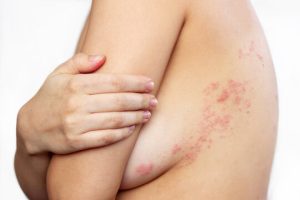
Annular desquamation (annular herpes). Moist, scabious herpes, with itching and burning sensation.
Sarsaparilla
Herpes and offensive sweat about genitals; the skin lies in folds; eruptions are prone to appear in spring, their base inflamed, the crusts detach readily out of doors and the adjoining skin becomes chapped.
Emaciated, shriveled, lies in folds (Abrot; Sanic), dry, flabby. Herpetic eruptions; ulcers. Rash from exposure to open air; dry, itching; comes on in spring; becomes crusty. Rhagades; skin cracked on hands and feet. Skin hard, indurated
Intolerable stench on genitals. Herpetic eruption on genitals. Itching on scrotum and perineum.
Nipples small, withered, retracted. Before menstruation, itching and humid eruption of forehead. Menses late and scanty. Moist eruption in right groin before menses
Natrum muriaticum
Greasy, oily, especially on hairy parts. Dry eruptions, especially on margin of hairy scalp and bends of joints. Fever blisters. Urticaria; itch and burn. Crusty eruptions in bends of limbs, margin of scalp, behind ears (Caust). Warts on palms of hands. Eczema; raw, red, and inflamed; worse, eating salt, at seashore. Affects hair follicles. Alopecia. Hives, itching after exertion. Greasy skin.
Male Sexual Organs:
Itching, titters, and excoriation between scrotum and thighs. Itching and stinging on glans and scrotum., secretion behind glans, like gonorrhea Bolani. Phimosis.
Excessive excitement of genital organs, and of the amative feelings; or dullness of sexual desire. Want of energy during coition. Impotence. Pollutions after coition. Strong fetid odor from genital organs. Hydrocele. Loss of hair from pubes.
Female Sexual Organs:
Prolapsus uteri with aching in loins, Itching in genital organs, Repugnance to coition – Coition are painful from dryness of vagina; burning smarting during; in anemic women with dry mouth and dry skin.
Leucorrhoea – Acrid (greenish) increased discharge when walking. Abundant discharge of transparent, whitish, and thick mucus from vagina.
Vulvitis with falling off of hair. Itching of external parts with falling off of hair. Pimples on mons veneris.
Child refuses breast; nursing sore mouth. Lancinating pains in breasts. Stitches beneath nipples (Breasts sensitive to slightest touch).
Graphitis
Obstinate dryness of the skin, absence of perspiration. Red spots on the skin, like flea-bites. Erysipelatous inflammations, vesicular erysipelas, like zona, on the abdomen and on the back. Itching of the varices on the lower limbs. Itching-stinging on the surface of a mole.
Eruptions oozing out a thick honey-like fluid. Titters are humid, scabby eruptions, sometimes with secretion of corrosive serum, or with itching in the evening, and at night.
Eruption of pimples and nodules (principally under hair and on covered parts) which itch very much.-Swelling and induration of the glands.
Encysted tumors, Corrosive nodules. Excoriation of the skin (in the bends of the limbs, groins, neck, behind the ears), especially in children, Proud flesh, and fetid pus, in ulcers, with tearing pains, burning, and shooting.
Scrofulous and syphilitic ulcers. Burning pain in an old cicatrix. Deformity and thickness of the nails.
Male Sexual Organs:
Tension and cramp-like pains in the genital parts, with troublesome voluptuous ideas. Eruption of pimples on the prepuce, and on the penis. Dropsical swelling of the prepuce and the scrotum.
Female Sexual Organs:
Great aversion to coitus. Vesicles and pimples on the vulva, Excoriation on the vulva and between the thighs. Soreness of the vagina.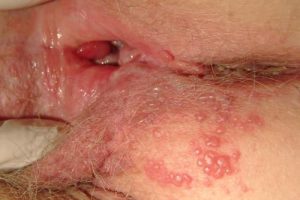
Cutting pains on the appearance of the catamenia and during the catamenia, flow of blood from the anus, pains in the limbs, ulcers become worse, swelling of the cheeks or of the feet, catarrh, with hoarseness and coryza, toothache, Painful sensibility and excoriation of the breasts, with eruption of running phlyctenule. Obstruction and induration of the mammary glands. Hard cicatrices remaining after mammary abscess.
Hepar sulph
Abscesses; suppurating glands are very sensitive. Papules prone to suppurate and extend.
Ulcers/acne in youth. Suppurate with prickly pain, easily bleed. Unhealthy skin; every little injury suppurates. Chapped skin, with deep cracks. Ulcers, with bloody suppuration, smelling like old cheese and are very sensitive to contact, burning, stinging, easily bleeding.
Sweats day and night without relief. “Cold-sores” very sensitive, Sticking or pricking in afflicted parts. Putrid ulcers, surrounded by little pimples. Great sensitiveness to slightest touch.
Chronic and recurving urticaria. Smallpox. Herpes Cincinnatus. Constant offensive exhalation from the body.
Male: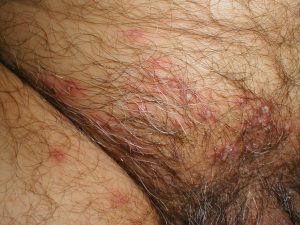
Herpes, sensitive, bleed easily. Ulcers externally on prepuce similar to chancre. Excitement and emission without amorous fancies. Itching of glans, frenum, and scrotum. Suppurating inguinal glands. Figworts with offensive odor. Humid soreness on genitals and between scrotum and thigh. Obstinate gonorrhoea.
Female:
Discharge of blood from uterus. Itching of pudenda and nipples, worse during menses. Menses late and scanty. Abscesses of labia with great sensitiveness. Extremely offensive leucorrhoea. Smells like old cheese (Sanicula). Profuse perspiration at the climacteric.
Merc solubilis
Vesicular and pustular eruptions. Ulcers, irregular in shape, edges undefined. Pimples around the main eruption. Itching, worse from warmth of bed. Crusta lactea; yellowish-brown crusts, considerable suppuration. Glands swell every time patient takes cold. Buboes. Orchitis
Male:
Vesicles and ulcers; soft chancre. Cold genitals. Prepuce irritated; itches. Nocturnal emissions, stained with blood.
Female:
Menses profuse, with abdominal pains. Leucorrhoea excoriating, greenish and bloody; sensation of rawness in parts. Stinging pain in ovaries (Apis Melifestida). Itching and burning; worse, after urinating; better, washing with cold water. Mammie painful and full of milk at menses.
Kreosotum
Skin.-Soft, unnatural feel of skin, with pegged teeth.-Violent itching all over body, esp. towards evening, and with burning sensation in arms and legs, after scratching.-Burning itching at night, and heat over whole body.-Nettle-rash.-Eruption, like bug-bites, with violent itching esp. in evening.-Large, greasy-looking, pox-shaped pustules over whole body.-Mealy and pustular, dry or humid titters (on backs of hands and fingers, in palms, on ears, elbows, knuckles, and malleoli), with violent itching in almost every part of body.
Male Sexual Organs:
Burning in genitals (during coition) and impotence. Prepuce bluish black with hemorrhages and gangrene.
Female Sexual Organs:
Premature catamenia, burning in the parts, Dwindling away of mammie, with small, hard, painful lumps in them. Cramp-like pains in external genitals. Excoriation, with smarting pains between genitals and thighs. Shootings in vagina, as if produced by electricity. Voluptuous itching in vagina. Itching in vagina, inducing rubbing in evening, succeeded by smarting, swelling, heat, and induration of external parts, with soreness in vagina when urinating.
Desire for coition especially in morning, After coition, pain, as of excoriation, and hard knottiness in neck of uterus, or swelling of the genital parts (both male and female) with burning pains (worse in morning than in evening).
After coition discharge of dark blood the next day. Vaginal Prolapses. Prolapses uteri. Pulling, stitches, and shootings in the mammary glands.
Medorrhinum
Yellowness of skin, Intense and incessant itching (and pricking) all over (back, vagina, labia etc). Fiery red band passing down neck, back, and perineum, and involving genitals and pubes. Fiery red rash about anus in babies the water/wetting scalds it terribly.
Scald-head. Tinea capitis, eyelids involved. Copper-colored spots (syphilitic) remaining after eruptions, thin yellow-brown and detach in scales, leaving skin clear and free. Small pedunculated warts, with pinheads, like small button mushrooms, on various parts of body and thigh. Favus. Fetid odor of body. Pains along urethra while urinating, drawing burning. (Suppressed gonorrhoea).
Variolinum
Exanthema of sharp, pointed pimples, usually small, seldom large and suppurating, dry, resting on small red areolae, frequently interspersed with spots of red color, sometimes severe itching. Petechial eruptions.
Var. 30 warded off an attack of small-pox after intense sickness of stomach had been caused by the smell of a case.
Var. 1m in water every two hours, given on third day of eruption of a confluent case cut short the attack.
Shingles. Enlargement of testicle. Hard swelling of testicle.
Alumen
Tendency to induration of neck of uterus and mammary glands (Carb an; Con). Chronic yellow vaginal discharge. Chronic gonorrhoea, yellow, with little lumps along urethra. Aphthous patches in vagina (Caul). Menses watery.
Ulcers, with indurated base. To be thought of in indurated glands, epithelioma, etc; veins become varicose and bleed. Indurations resulting from long-continued inflammatory irritations. Glands inflame and harden. Alopecia, Scrotal eczema and on back of penis.
Sulphur
Skin dry, scaly, unhealthy; every little injury suppurates. Freckles. Itching, burning; worse scratching and washing. Pimply eruption, pustules, rhagades, hang-nails. Excoriation, especially in folds (Lyc). Feeling of a band around bones. Skin affections after local medication. Pruritus, especially from warmth, in evening, often recurs in spring and in damp weather.
What are possible complications of an Epstein-Barr virus infection?
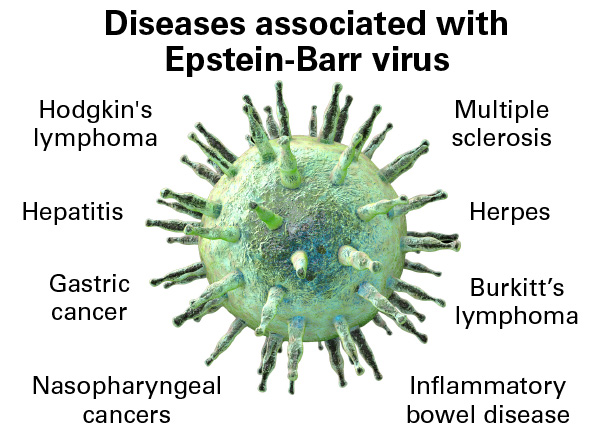
Light-colored cells are leukemia cells that contain EBV; SOURCE: CDC
Possible complications of EBV are as follows:
- Enlarged spleen
- Red spots and/or rash
- Liver inflammation and/or swelling
- Jaundice
- Anemia
- Splenic rupture
- Severe swollen tonsils
- Breathing difficulties (usually due to swollen throat tissue)
- Irregular heartbeat
- Possible increased risk for cancer (lymphomas)
P. S : This article is only for doctors having good knowledge about Homeopathy and allopathy, for learning purpose(s).
For proper consultation and treatment, please visit our clinic.
Location, address and contact numbers are given below.
NoN of above mentioned medicine(s) is/are the full/complete treatment, but just hints for treatment; every patient has his/her own constitutional medicine.
To order medicine by courier, please send your details at WhatsApp– +923119884588
 Dr. Sayyad Qaisar Ahmed (MD {Ukraine}, DHMS), Abdominal Surgeries, Oncological surgeries, Gastroenterologist, Specialist Homeopathic Medicines.
Dr. Sayyad Qaisar Ahmed (MD {Ukraine}, DHMS), Abdominal Surgeries, Oncological surgeries, Gastroenterologist, Specialist Homeopathic Medicines.
Senior research officer at Dnepropetrovsk state medical academy Ukraine.
Location: Al-Haytham clinic, Umer Farooq Chowk Risalpur Sadder (0923631023, 03119884588), K.P.K, Pakistan.
Find more about Dr Sayed Qaisar Ahmed at :
https://www.youtube.com/Dr Qaisar Ahmed
